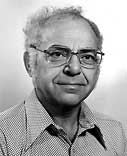Noah Sherman
Physics Emeritus Professor Noah Sherman, who left U-M for a time to work with Dr. Edward Teller at the Livermore Laboratory at the University of California and eventually became an award-winning lawyer, died June 11, 2006.

Sherman, born in New York City on June 24, 1921, received his Bachelor of Science from the City College of New York in 1948. He moved to Ann Arbor and obtained a doctorate in physics in 1952 at U-M with a specialty in experimental cosmic ray physics. He was an instructor in physics from 1952-53, then switched to theoretical physics with an appointment at the Livermore Laboratory. Sherman did calculations that were published in the Physical Review.
He returned to U-M as assistant professor of physics in 1956. Sherman was promoted to associate professor in 1961 and to professor in 1966. He was active in the development of a variety of new teaching techniques for general physics courses, focusing on computer-based and self-paced methods. He participated in the Academic Year Institutes held for high school physics teachers at the University and served as a liaison between the Physics Department and the Center for Learning and Teaching.
Sherman’s service to the University included membership in the Senate Advisory Committee on University Affairs and assistance on a committee that led to the establishment of the Residential College. He took a sabbatical leave from 1963-65 to work at the New University of Sussex in England and another in 1969 for work at the University of California Berkeley.
After retiring from physics at U-M in 1978, Sherman pursued a desire to serve society in a more personal way. He moved to Berkeley and went to law school, to further causes in which he believed. A measure of his success during this part of his career was his receipt of the State Bar’s 1997 President’s Pro Bono Service Award. Sherman was presented with the award for providing free legal help to individuals threatened with the loss of their Supplemental Security Income benefits.
He is survived by his wife Pauline, a retired professor of engineering from both U-M and the University of California Berkeley.

